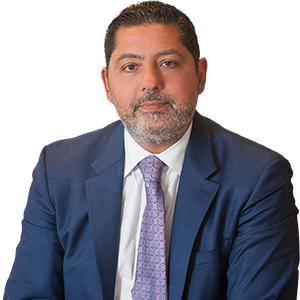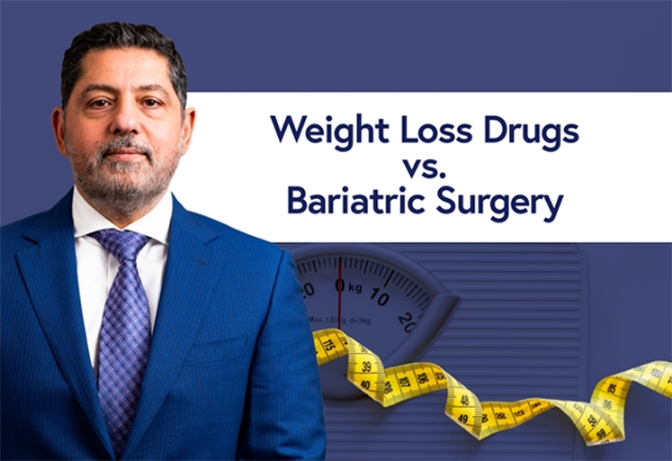Weight Loss Drugs vs. Bariatric Surgery – Which is Right For You?
If you’re trying to lose weight and finding it difficult, you may have considered taking medications or undergoing bariatric surgery. Both of these... read more
Call Us Today (732) 640-5316
E-Waiting RoomGastroesophageal reflux disease or GERD is a sometimes painful condition that can do permanent damage to your lower esophageal sphincter and your throat. Doctors often start by recommending medication to control the symptoms, but laparoscopic anti-reflux surgery at Advanced Surgical & Bariatrics of NJ, PA stops the symptoms once and for all. And you won’t need to take medication anymore for your GERD. Call the office nearest you in NY, NJ or PA to see if laparoscopic anti-reflux surgery is right for you.
Laparoscopic anti-reflux surgery is a medical procedure used for treating esophagus diseases, such as gastroesophageal reflux disease or GERD. GERD is a common esophagus disease that you may know as acid reflux. It makes itself known with heartburn symptoms. This feeling can be mild to severe, causing a burning sensation that radiates from your stomach, throughout your chest and sometimes up through your throat. Other signs you may be suffering from acid reflux include:
Sometimes, your reflux disease can cause other problems, such as a hiatus hernia. To correct this, you might have to undergo a laparoscopic hernia surgery, which you can have completed at the same time as your reflux surgery. At NJ bariatric center of Advanced Surgical & Bariatrics of NJ, PA, the bariatric doctors are highly trained to assess all your symptoms. After thorough examinations, they determine whether you’d benefit from laparoscopic anti-reflux surgery or a LINX procedure, which is an alternative to laparoscopic anti-reflux surgery.
You can get GERD when your lower esophageal sphincter, also known as the LES, starts to malfunction. The LES is a band of muscles that work as a valve at the base of your esophagus, where it guards the opening to your stomach. The valve allows food to pass into the stomach while keeping dangerous stomach acids from reaching up into your esophagus.
When your LES doesn’t work properly, stomach acids splash back up into your esophagus. That’s what causes your heartburn symptoms. Other ways GERD can develop is through poor lifestyle choices, such as:
While most people respond well to medicine to control their acid reflux, some can’t take medication due to complications with other current treatments or medical conditions. Plus, those medications have been known to cause major side effects, such as:
On the other hand, about 90 percent of patients report vast improvement in their acid reflux after surgery. Some people opt for the laparoscopic anti-reflux surgery because they are tired of taking medication for their GERD symptoms. In some cases, the medication stops working or ends up providing very little relief. Under such circumstances, it’s better to have the reflux surgery, since continuous acid reflux can damage your esophagus and even your throat.
This place was amazing I forgot my card at home and they still took me in and allowed me to pay once I got home. Then my ultrasound tech Lexi made everything very comfortable, she was so sweet, she was very professional and I love how she treated me, this girl deserves a raise!! I would definitely recommend coming here if you want to get the best treatment!!
Amelia G.The doctors at Advanced Surgical & Bariatrics of NJ, PA may need to order some tests before confirming your GERD diagnosis. You may need to undergo blood work, chest X-rays, recording your medical history and even an EKG if applicable.
Before the surgery, your doctor advises you to stop taking certain drugs like aspirin, blood thinners, anti-inflammatory medications and vitamin E for several weeks. The surgery itself is a relatively simple procedure:
You may need to stay over for two to three days in the hospital. Laparoscopic anti-reflux surgery minimizes the discomfort you feel after the procedure. Your recovery time is also reduced, compared to open surgeries. You’re left with minimum visible scarring due to the small incision marks. After the surgery, you no longer need to take any anti-reflux medication.
You may feel sore for 24 to 48 hours after you leave the hospital. To get through any post-operative discomfort, your doctor can prescribe pain medication, but it’s just for short-term relief. You need to adhere strictly to the recommended dietary restrictions: clear liquid foods in the beginning and then slowly weaning yourself back to solid foods.
Avoid straining and lifting heavy objects. You are, however, encouraged to keep moving by walking and doing light work at home. Most people return to their jobs in two to three weeks after the laparoscopic anti-reflux surgery, but you shouldn’t drive for seven to 10 days. Contact us to learn which procedure is better for you.

Dr. Ragui Sadek is a premier surgeon who established a state-of-the-art and one of the safest bariatric surgery programs in the state. Dr. Sadek has fellowship training in both laparoscopic/bariatric surgery and surgical trauma/critical care, allowing him to safely perform complex surgeries on patients who have been turned down by other practices. As a Clinical Assistant Professor of surgery at RWJ Medical School & the Director of bariatric surgery program at RWJ University Hospital, Dr. Sadek offers a cutting-edge range of laparoscopic, robotic, & bariatric surgical procedures with a complication rate substantially below the national average.
Dr. Sadek is a Clinical Assistant Professor of Surgery at Rutgers-Robert Wood Johnson Medical School and a Fellow of the American College of Surgeons. Having performed more than three thousand advanced surgical procedures, Dr. Sadek has established a strong patient satisfaction rate and a solid reputation among the surgical community and is renowned as a top physician in his field by International Association of Healthcare Professionals. As a board-certified surgeon, he holds affiliations with the American Society of Metabolic and Bariatric Surgery and the Society of American Gastro Endoscopic Surgeons. More about Dr. Sadek
Stay current with Advanced Surgical & Bariatrics of New Jersey

If you’re trying to lose weight and finding it difficult, you may have considered taking medications or undergoing bariatric surgery. Both of these... read more

Are you frustrated with your inability to lose weight? Tired of being trapped in an endless cycle of yo-yo dieting, over-exercising, cleanses, and... read more